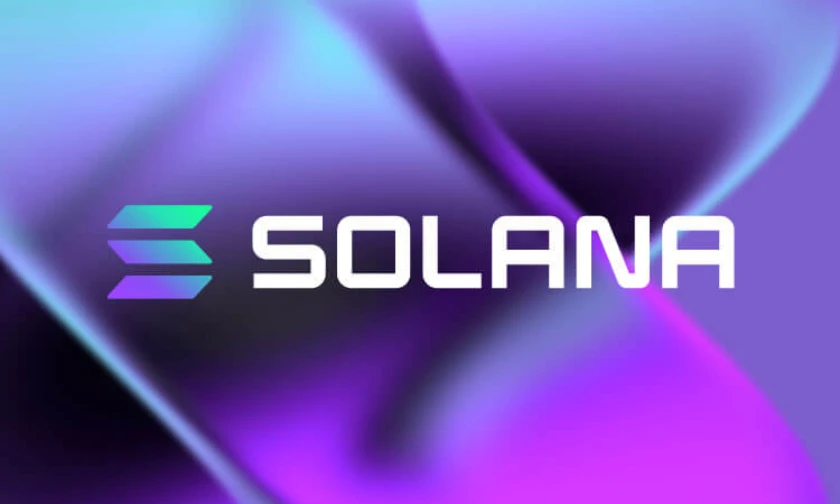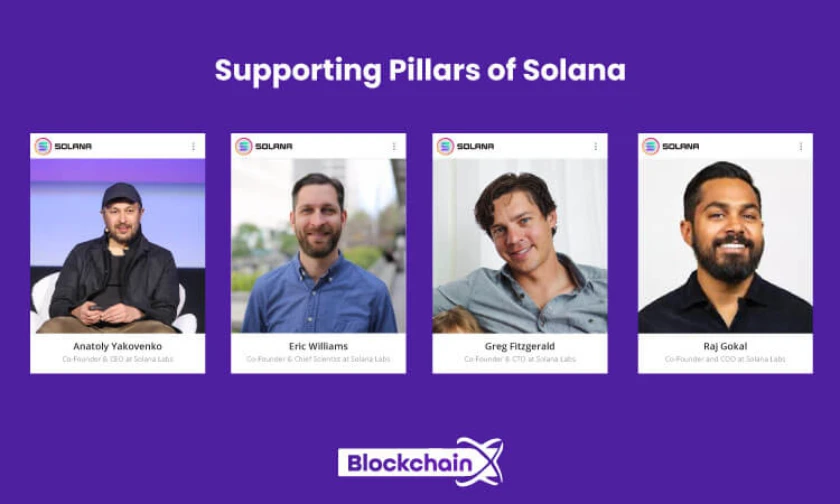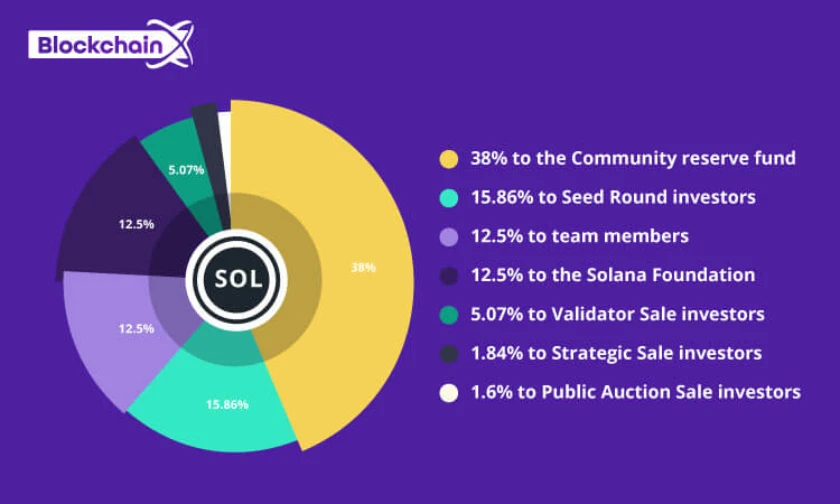
Solana: The world's first blockchain to use proof of history
When comparing the prominent Ethereum blockchain, Salona is very fast and is the most high-throughput blockchain in the market. Let your next project start with Solana, a fast and innovative blockchain.

Blockchain technology aims to make transactions instantaneous, no matter where you sit. So, how fast are blockchain networks? Have you ever wondered?
The fastest transaction record for Ethereum 2.0 blockchain is 10,000 transactions per second (TPS). But if you ask if there is any other high-speed network in the market today to compete with this. That's Solana. The Solana blockchain has an attribute of cryptographic time-sampling that can manage network traffic and scale up to 65,000 TPS. So Solana is the fastest public blockchain for single transactions at the moment.
Now, you understand transaction speed (TS) is one of the significant factors in blockchain development as it also drives network traffic. So, what is the benefit of this fast transaction process? Blockchain's high transaction speed results in better data exchange between various parties up to firm transactions.
Go through this blog and let's deep dive from one end to the other end of Solana Blockchain. Everything you need to know about Solana Blockchain.
What is the Solana Blockchain?
Solana is a public blockchain service built to be decentralized and very quick in terms of transaction speeds. the consensus mechanism behind this fast network is proof of history and proof of stake.
In this Web3 terminology, Solana is considered a Layer 1 chain, which means it provides the fundamental base structure to build smart contracts. Solana and Ethereum blockchain are similar in that both offer their token and a distributed machine to execute smart contracts and connects decentralized apps (dApps).
Solana can manage peer-to-peer transactions using its native token called SOL and can reach up to 50,000 TPS. Solana is one of the most used blockchains for developing on-chain applications, and it supports smart contracts and non-fungible tokens.
Do you know who the founder of Solana is?
Solana was founded in 2017 by Anatoly Yakovenko. Anatoly Yakovenko is a Russian computer engineer who authored the Solana White Paper.
2021 was a successful year for Solana, with the project garnering a lot of attention despite Ethereum's glacial transition to Ethereum 2.0. Solana's SOL token went from an average of $2 in 2020 to over $200 in 2021.
Yakovenko says of Solana that the NFT use case is "obvious going forward. Every technology you build for finance means the network needs to be as cheap, fast, and reliable as possible, while Solana is built as "a blockchain at Nasdaq speed."
Supporting Pillars of Solana

Token Economics and Distribution of Solana
SOL is Solana's native token. You can use SOL to pay transaction fees and interact with various dApps. Getting SOL is also easy, you can earn SOL by contributing to the network as a node or validator. Tokanomics behind SOL revolves around scalability and security. Within the network we can use the SOL for two purposes, they are
Staking
The Solana network uses a proof-of-stake consensus mechanism. Each validator in the network has the opportunity to participate in consensus on which blocks they believe should be added to the blockchain, thereby confirming any valid transactions contained in those particular blocks. However, not all validator's votes count equally.
You can stake your SOL directly into the network or delegate your holding to an active validator. Stakeholders get inflationary benefits in exchange. Solana recently made its inflation compensation possible this year.
Used as transaction and smart contracts fee
If you are a Solana user, you can use SOL to send transaction fees and execute/run smart contracts. SOL can help you to interact with dApps.
Solana distributed the token SOL in five financing rounds, four of which were private sales. This private sale began in the first quarter of 2019 and culminated in MultiCoin Capital's $20 million Series A, which was disclosed in July 2019. Other partners included Distributed Global, BlockTower Capital, Foundation Capital, BlockChange VC, Slow Ventures, NEO Global Capital, Passport Capital, and Rockaway Ventures. In exchange for their investments, companies received SOL tokens.
The team did not disclose how many tokens private investors acquired through the sale. The fourth and final private sale took place in 2020. The team raised $4 million from a public auction hosted by CoinList.
The initial distribution of SOL tokens is as follows:

Blockchain consensus mechanisms
The term consensus mechanism refers to the entire collection of protocols, incentives, and concepts that allow a network of nodes to agree on the state of a blockchain.
A blockchain is called a distributed ledger or database. Each blockchain has several nodes that have unique identity numbers. Each node has two roles to accomplish, they make claims and validate them.
When making a claim, a node acts in the role of a client application. In blockchain terminology, this type of node is called a wallet. A wallet takes its private key and makes an assertion or claim to the network. The network then passes that claim to a validation task. Nodes selected for the validation task are called full nodes or validator nodes.
Blockchain uses a consensus mechanism to send claims through the network. A network's consensus mechanism is the algorithm used to arrive at a shared version of the truth.
The Proof of History: Solana’s Consensus Mechanism
Proof of History is just one of the innovations that make Solana the most performant blockchain in the world.
The consensus mechanism is a fundamental characteristic and difference between blockchains. But Solana's consensus mechanism is worth picking up. Solana follows a different mechanism from the existing consensus mechanism. In particular, the Proof of History algorithm enables faster processing times and lower transaction costs.
It is not too difficult to learn what the proof of history mechanism is. All of these are detailed in Solana's white paper. However, it is a bit difficult to understand how to speed up transaction time and reduce transaction costs.
The key issue in blockchains is agreeing on the time and order in which events occur. Solana uses Proof of History (PoH) to overcome this problem by establishing a cryptographically secure time source across the network.
Proof of history is a high-frequency verifiable delay function (VDF) that takes a fixed number of steps to evaluate but returns a unique result that can be verified in public.
Proof of Stake and the verifiable delay function
Even if there is a proof of history mechanism, Solana additionally requires a consensus mechanism, for which the proof of stake mechanism is used. But its validators do their proof of work against blocks called verifiable delay functions (VDFs).
The main idea of VDF is to run a function that takes input and produces an output that cannot be predicted without running the function. Then you chain these together - the output of the last function provides the input to the next function.
A cryptographic hash function is used to chaining the VDFs. This provides an ongoing stream of cryptographically verifiable moments in time.

Solana’s Performance Range Over other Giants
Solana's blockchain status is still a step behind. The idea of running a multi-billion-asset network as a trial might raise a few eyebrows, but that's Web3 for you. Solana sees it as going through a process of shaking out bugs to achieve high stability based on the proof-of-history concept.
Let’s see the performance advantage that is possible with Solana's PoH mechanism,
| Bitcoin | 10 minutes |
| Ethereum 1.0 | 10 to 19 seconds |
| Ethereum 2.0 | 12 to 14 seconds |
| Solana | 800 milliseconds |





